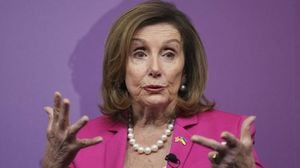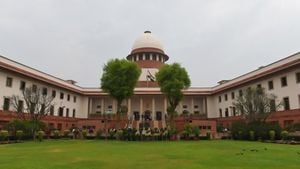At the University of Mississippi, the recent announcement of a mistrial concerning the high-profile murder case of Jimmie "Jay" Lee has stirred up conversations and reactions across campus and beyond. On Wednesday night, Circuit Judge John Kelly Luther declared the mistrial for Timothy Herrington, Jr., charged with capital murder following Lee's mysterious disappearance back on July 8, 2022. The courtroom buzzes with mixed emotions, as many folks there voiced feelings of disbelief and frustration. "People were kind of shocked at the outcome — a mistrial, a hung jury — and how seemingly there’s a person who’s going to get away with something..." remarked Marlon Kirven, a junior at the university.
Lee, who became well-known within the LGBTQ+ community at Ole Miss, vanished without trace almost two years ago, prompting widespread concern and investigation. Despite the attention the case received, jurors reported they were unable to reach a unanimous verdict after more than nine hours of deliberation. During this deliberation, Judge Luther sent the jurors back twice for additional discussions after they indicated they were deadlocked with likely a vote of 11 to 1, though the exact leaning remains unclear.
Before the judge made the decision official, Herrington, 24, sat quietly alongside his defense team. He remains charged with capital murder, which, under Mississippi law, can apply when someone is killed during the commission of another felony—in this case, alleged kidnapping. At this point, Herrington is free on bond, though he faces dire potential consequences if retried, including life imprisonment. The judge mentioned options for future trials and hearings on pretrial motions, though neither side commented immediately.
The circumstances surrounding Lee's disappearance are troubling. Prosecutors outlined during the trial how Herrington had contacts with Lee leading up to his disappearance, including text messages and suspected online searches indicating premeditated actions. Herrington, at the time of the trial, had not publicly identified as gay, which adds layers of complexity to the case. Testimony revealed apps and social media correspondence between the two men, with authorities even obtaining search warrants for their communications. Some messages suggested Lee was coerced back to Herrington’s apartment after their initial meet-up.
Oxford Police Chief Jeff McCutchen, who testified during the trial, reaffirmed the commitment of law enforcement to the case, stating, "Our commitment remains unshaken, and our job is far from over. We have not stopped looking for Jay Lee since July 8, 2022, and we will not stop until we bring him home to his family. If you have any information... please contact us."
According to reports, the investigation escalated quickly after Lee's disappearance, leading to Herrington's arrest roughly two weeks later. Various investigative actions included examining electronic records and analyzing Herrington's behavior, which reportedly included purchasing duct tape shortly after Lee’s last known communication.
For many, the mystery surrounding Lee’s fate stirs both anger and sadness, particularly as community members hoped for swift justice. The discussion about the jury’s deadlock also raises questions about the intricacies of the trial system. Though the prosecution had outlined possible charges—ranging from capital to lesser forms of murder—the absence of Lee's body presented significant obstacles for the prosecutorial team.
Legal experts have weighed in on the situation, noting how common it is to see juries struggle with high-profile cases and heavy emotional stakes. Booneville attorney Casey Lott highlighted how hard it is to gauge the dynamics within the jury room and the factors contributing to their ultimate decision, or lack thereof. According to law professor Ron Rychlak, for example, the fact there was only one dissenting juror complicates the matter; potentially allowing for various interpretations of intent and culpability among jurors.
There seems to be considerable interest from the prosecution to potentially retry Herrington, yet the judge has also indicated the necessity for proper discussions between both the defense and prosecution before any decisions are made. Herrington’s attorney was quick to point out the challenges posed by not having Lee’s body, reinforcing their argument against conviction without concrete evidence of death.
With several weeks now to work through the possible outcomes, many involved await the judge's decision on Herrington’s bond status and anticipate motions for retrial. Whether this case will see more courtroom drama or result otherwise remains to be seen, as community members voice their frustrations and hopes for clarity and resolution. Lee's friends, family, and supporters continue to advocate for answers, keeping his memory alive as the wheels of justice turn slowly forward.



